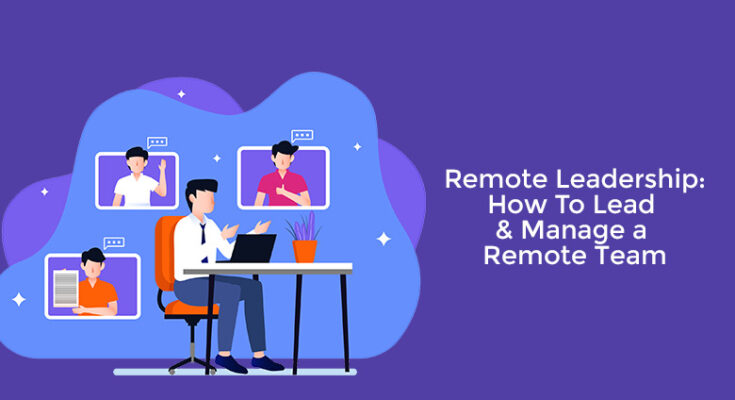Remote Leadership Mastery: Inspiring and Managing Virtual Teams
Written by harrison

Cultivating a Culture of Trust and Transparency
Delve into the importance of cultivating a culture of trust and transparency in remote leadership. Explore how leaders can establish clear communication channels, foster open dialogue, and build trust within virtual teams, creating a foundation for collaboration and cohesive teamwork.
Transparent Communication: Setting Expectations Clearly
Explore the practice of transparent communication in setting expectations clearly for virtual teams. Understand how leaders can articulate goals, timelines, and performance expectations, ensuring that team members have a comprehensive understanding of their roles and responsibilities in a remote work environment.
Trust-Building Initiatives: Fostering Connections Virtually
Delve into trust-building initiatives aimed at fostering connections among virtual team members. Explore how leaders can organize virtual team-building activities, encourage informal interactions, and provide platforms for sharing personal experiences, contributing to the development of strong team bonds.
Leveraging Technology for Seamless Collaboration
Explore the leveraging of technology for seamless collaboration in remote leadership. Understand how leaders can implement collaboration tools, project management platforms, and communication software to facilitate real-time interactions, streamline workflows, and enhance the overall efficiency of virtual teams.
Virtual Whiteboards for Collaborative Brainstorming
Delve into the use of virtual whiteboards for collaborative brainstorming in remote teams. Explore how leaders can leverage tools like Miro or Microsoft Whiteboard to facilitate interactive idea generation, mind mapping, and creative collaboration, fostering innovation within virtual workspaces.
Unified Communication Platforms for Streamlined Interaction
Explore the implementation of unified communication platforms for streamlined interaction in remote teams. Understand how leaders can centralize communication channels, integrating messaging, video conferencing, and document sharing to create a cohesive and connected virtual work environment.
Prioritizing Well-Being in Virtual Team Dynamics
Examine the prioritization of well-being in virtual team dynamics as a cornerstone of effective remote leadership. Explore how leaders can support the mental and emotional health of remote team members, fostering a positive work environment and enhancing overall team resilience.
Flexible Work Schedules: Empowering Work-Life Balance
Delve into the implementation of flexible work schedules as a means of empowering work-life balance in remote teams. Explore how leaders can establish policies that accommodate varying time zones, personal commitments, and individual preferences, promoting a healthier work-life integration.
Virtual Wellness Initiatives: Nurturing Team Health
Explore the organization of virtual wellness initiatives aimed at nurturing team health in remote environments. Understand how leaders can promote fitness challenges, mindfulness sessions, or mental health resources, contributing to the well-being and engagement of virtual team members.
Effective Communication Strategies for Remote Leaders
Delve into effective communication strategies for remote leaders in navigating virtual team dynamics. Explore how leaders can adapt their communication styles, employ active listening techniques, and leverage visual aids to convey messages clearly and maintain strong connections with remote team members.
Video Conferencing Best Practices: Enhancing Virtual Presence
Explore best practices in video conferencing to enhance virtual presence in remote leadership. Understand how leaders can optimize camera angles, lighting, and background settings to create a professional and engaging virtual presence, fostering a sense of connection during online meetings.
Visual Communication Tools for Clarity
Delve into the use of visual communication tools for clarity in remote leadership. Explore how leaders can utilize infographics, charts, and visual presentations to convey complex information in a clear and concise manner, ensuring understanding and alignment within virtual teams.
Developing Remote Leadership Skills Through Training
Explore the development of remote leadership skills through training initiatives. Understand how leaders can invest in training programs that focus on virtual leadership competencies, equipping them with the knowledge and skills needed to navigate the challenges of managing remote teams effectively.
Virtual Leadership Workshops: Building Competencies
Delve into the organization of virtual leadership workshops aimed at building competencies in remote leaders. Explore how leaders can participate in or facilitate workshops covering topics such as virtual team management, conflict resolution, and effective communication in a remote work setting.
Continuous Learning Platforms for Remote Leadership
Explore the use of continuous learning platforms for ongoing development in remote leadership. Understand how leaders can leverage online courses, webinars, and e-learning modules to stay updated on industry trends, leadership best practices, and emerging technologies impacting remote work.
Challenges and Opportunities in Remote Leadership
Examine challenges and opportunities associated with mastering remote leadership.
Mitigating Feelings of Isolation: Strategies for Connection
Explore strategies for mitigating feelings of isolation among remote team members. Understand how leaders can create opportunities for virtual social interactions, establish buddy systems, and implement regular check-ins to foster a sense of connection and belonging within the remote team.
Seizing Opportunities for Global Talent Acquisition
Delve into the opportunities presented by global talent acquisition in remote leadership. Explore how leaders can tap into a diverse talent pool by recruiting individuals from different geographical locations, fostering a dynamic and inclusive virtual team culture.
Future Frontiers: Artificial Intelligence (AI) in Virtual Team Collaboration
Explore the future frontiers of remote leadership, including the potential of artificial intelligence (AI) in virtual team collaboration.
AI-Powered Productivity Tools: Enhancing Efficiency
Delve into the potential of AI-powered productivity tools for enhancing efficiency in virtual team collaboration. Explore how leaders can leverage AI algorithms for automating repetitive tasks, optimizing workflows, and providing data-driven insights to improve overall team productivity.
Virtual Reality (VR) Leadership Simulations: Immersive Training
Explore the use of virtual reality (VR) leadership simulations for immersive training in remote leadership. Understand how leaders can engage in realistic VR scenarios that simulate challenging leadership situations, allowing for hands-on practice and skill development in a virtual environment.
Adapting Leadership Styles to Virtual Environments: Strategies for Remote Success
Embark on a deeper exploration of leadership styles and their adaptation to virtual environments, unveiling strategies for remote success. This segment delves into the nuances of leadership in the digital landscape, exploring various leadership approaches and their application to inspire and guide remote teams effectively.
Transformational Leadership in Virtual Realms
Delve into the concept of transformational leadership and its application in virtual realms. Explore how leaders can inspire and motivate remote teams by fostering a shared vision, encouraging innovation, and providing individualized support to team members, creating a positive and forward-thinking virtual work environment.
Visionary Communication: Painting a Compelling Future
Explore visionary communication as a pillar of transformational leadership in remote settings. Understand how leaders can articulate a compelling vision for the future, aligning virtual teams with overarching goals and instilling a sense of purpose that transcends geographical boundaries.
Individualized Support: Recognizing and Nurturing Talent
Delve into the practice of individualized support to recognize and nurture talent in remote teams. Explore how leaders can tailor their leadership approach to the unique strengths and needs of each team member, promoting professional development and empowering individuals to reach their full potential.
Situational Leadership: Adaptive Guidance in Virtual Scenarios
Examine the application of situational leadership for adaptive guidance in virtual scenarios. Understand how leaders can assess the readiness and competence of remote team members, adjusting their leadership style to provide the appropriate level of direction, support, and autonomy based on individual and situational factors.
Directing and Coaching: Guiding Through Challenges
Delve into the directing and coaching aspects of situational leadership, guiding remote teams through challenges. Explore how leaders can provide clear instructions and hands-on guidance when needed, as well as coaching support to enhance skills and foster continuous improvement in virtual work settings.
Supporting and Delegating: Empowering Autonomy
Explore the supporting and delegating dimensions of situational leadership, empowering autonomy in remote teams. Understand how leaders can offer encouragement, resources, and trust to team members, allowing them to take ownership of tasks and make decisions independently, contributing to a culture of accountability.
Servant Leadership: Prioritizing Team Well-Being
Delve into the principles of servant leadership and their emphasis on prioritizing team well-being in virtual environments. Explore how leaders can adopt a service-oriented mindset, focusing on the holistic development and satisfaction of remote team members, ultimately fostering a positive and collaborative virtual work culture.
Empathy and Active Listening: Building Connection Virtually
Explore the role of empathy and active listening in servant leadership for building connection virtually. Understand how leaders can demonstrate genuine care, listen attentively to the concerns and feedback of remote team members, and proactively address their needs, cultivating a supportive and compassionate work environment.
Facilitating Growth Opportunities: Nurturing Development
Delve into the facilitation of growth opportunities as a key element of servant leadership in remote teams. Explore how leaders can create pathways for skill development, mentorship, and career advancement, aligning individual aspirations with organizational objectives and promoting continuous learning.
Distributed Leadership: Fostering Collaboration and Inclusivity
Examine the concept of distributed leadership and its role in fostering collaboration and inclusivity in remote teams. Explore how leaders can distribute responsibilities, encourage shared decision-making, and empower individuals across the virtual team, fostering a sense of ownership and collective responsibility.
Collaborative Decision-Making: Harnessing Collective Intelligence
Explore collaborative decision-making as a hallmark of distributed leadership in virtual environments. Understand how leaders can leverage diverse perspectives within remote teams, encouraging active participation in decision-making processes and harnessing the collective intelligence of the entire team.
Inclusive Team Culture: Valuing Diverse Contributions
Delve into the promotion of an inclusive team culture as a fundamental aspect of distributed leadership. Explore how leaders can celebrate diversity, recognize and value the unique contributions of each team member, and create an environment where every voice is heard and respected in the virtual workspace.
Challenges and Opportunities in Adaptive Leadership
Examine challenges and opportunities associated with adaptive leadership styles in virtual environments.
Balancing Flexibility and Structure: Navigating Virtual Dynamics
Explore the challenge of balancing flexibility and structure in adaptive leadership for virtual teams. Understand how leaders can establish clear expectations while allowing for flexibility, navigating the dynamics of remote work and ensuring that team members feel supported and empowered.
Leveraging Diversity for Innovation: A Strategic Advantage
Delve into the opportunity presented by leveraging diversity for innovation as a strategic advantage in adaptive leadership. Explore how leaders can capitalize on the varied perspectives and experiences within virtual teams, fostering creativity, problem-solving, and innovation through the integration of diverse viewpoints.
Future Frontiers: Augmented Reality (AR) for Enhanced Virtual Collaboration
Explore the future frontiers of leadership in virtual environments, including the potential of augmented reality (AR) for enhanced virtual collaboration.
AR-enhanced Virtual Meetings: Interactive and Immersive Experiences
Delve into the potential of augmented reality (AR) for enhancing virtual meetings with interactive and immersive experiences. Explore how leaders can use AR to create engaging presentations, collaborative brainstorming sessions, and interactive workshops, elevating the overall quality of virtual collaboration.
Virtual Reality (VR) Leadership Retreats: Building Strong Connections
Explore the use of virtual reality (VR) for leadership retreats aimed at building strong connections among remote team members. Understand how leaders can organize VR retreats that simulate in-person experiences, fostering team bonding, camaraderie, and a shared sense of purpose in a virtual environment.
Enhancing Virtual Team Productivity: Strategies for Optimal Performance
Embark on a comprehensive exploration of strategies aimed at enhancing virtual team productivity, delving into the key elements and practices that contribute to optimal performance in remote work environments. This segment provides actionable insights for leaders seeking to maximize the efficiency and effectiveness of their virtual teams.
Goal Setting and Clarity: Establishing a Roadmap for Success
Delve into the significance of goal setting and clarity in establishing a roadmap for success in virtual team productivity. Explore how leaders can communicate clear objectives, milestones, and performance expectations, providing remote team members with a roadmap that guides their efforts towards achieving collective and individual goals.
SMART Goals: Specific, Measurable, Achievable, Relevant, Time-Bound
Explore the implementation of SMART goals as a framework for goal setting in virtual teams. Understand how leaders can define Specific, Measurable, Achievable, Relevant, and Time-Bound goals, creating a structured and actionable approach that enhances focus and accountability among remote team members.
Regular Goal Reviews: Aligning Efforts and Adjusting Strategies
Delve into the practice of regular goal reviews to align efforts and adjust strategies in virtual teams. Explore how leaders can conduct periodic assessments of progress, celebrate achievements, and make necessary adjustments to ensure that the team remains aligned with overarching objectives and adapts to changing circumstances.
Effective Time Management Strategies for Remote Teams
Examine effective time management strategies tailored for remote teams, recognizing the unique challenges and opportunities associated with distributed work environments. Explore how leaders can empower remote team members with tools, techniques, and best practices to optimize their time and enhance overall productivity.
Time Blocking Techniques: Structuring Work for Focus
Explore time blocking techniques as a means of structuring work for focus and productivity in remote settings. Understand how leaders can encourage remote team members to allocate dedicated time blocks for specific tasks, minimizing distractions and fostering deep concentration on critical activities.
Priority Management: Identifying and Addressing Key Tasks
Delve into the importance of priority management in virtual teams, emphasizing the identification and timely addressing of key tasks. Explore how leaders can collaborate with team members to establish clear priorities, ensuring that efforts align with organizational goals and contribute to overall project success.
Collaboration and Communication Optimization
Explore strategies for optimizing collaboration and communication in virtual teams, recognizing the pivotal role these elements play in fostering a cohesive and connected remote work environment.
Collaborative Platforms: Streamlining Project Workflows
Delve into the use of collaborative platforms for streamlining project workflows in virtual teams. Explore how leaders can leverage tools such as Slack, Microsoft Teams, or Asana to facilitate real-time communication, document sharing, and collaborative project management, enhancing efficiency and transparency.
Synchronous and Asynchronous Communication: Striking the Right Balance
Explore the balance between synchronous and asynchronous communication in virtual teams. Understand how leaders can establish clear guidelines for when real-time interactions are essential and when asynchronous communication methods, such as email or project management tools, are more appropriate, promoting effective and flexible communication.
Remote Team Engagement and Motivation
Examine strategies for remote team engagement and motivation, acknowledging the importance of fostering a positive and energized work atmosphere among virtual team members.
Virtual Team Building Activities: Strengthening Bonds
Explore the organization of virtual team building activities as a means of strengthening bonds among remote team members. Understand how leaders can introduce engaging and collaborative experiences, fostering a sense of camaraderie and teamwork despite physical distance.
Recognition and Appreciation: Valuing Contributions
Delve into the practice of recognition and appreciation to value the contributions of remote team members. Explore how leaders can acknowledge achievements, express gratitude, and celebrate milestones, contributing to a positive and supportive virtual team culture that boosts motivation.
Continuous Learning and Skill Development
Examine the promotion of continuous learning and skill development in virtual teams, recognizing the dynamic nature of work and the importance of staying abreast of industry trends and emerging technologies.
Virtual Training Programs: Nurturing Professional Growth
Explore the implementation of virtual training programs to nurture professional growth in remote teams. Understand how leaders can provide opportunities for team members to acquire new skills, attend webinars, and participate in online courses, fostering a culture of continuous learning within the virtual workspace.
Skill Assessment and Feedback: Tailoring Development Plans
Delve into the importance of skill assessment and feedback in tailoring development plans for remote team members. Explore how leaders can conduct regular assessments of individual and team skills, providing constructive feedback and crafting personalized development plans that align with career aspirations and organizational needs.
Challenges and Opportunities in Virtual Team Productivity
Examine challenges and opportunities associated with optimizing productivity in virtual teams.
Addressing Burnout: Strategies for Well-Being
Explore strategies for addressing burnout and prioritizing well-being in virtual teams. Understand how leaders can implement measures such as flexible schedules, wellness initiatives, and mental health resources to mitigate burnout and ensure the overall well-being of remote team members.
Seizing Opportunities for Global Collaboration: A Competitive Edge
Delve into the opportunity presented by seizing global collaboration as a competitive edge in virtual teams. Explore how leaders can leverage the diversity and talent from different geographical locations, fostering innovation, creativity, and a global perspective that can propel the organization ahead in a competitive landscape.
Future Frontiers: Artificial Intelligence (AI) in Virtual Team Productivity
Explore the future frontiers of virtual team productivity, including the potential of artificial intelligence (AI) in optimizing collaboration and efficiency.
AI-Enhanced Project Management: Automation and Insights
Delve into the potential of AI-enhanced project management for automation and insights in virtual teams. Explore how leaders can leverage AI algorithms to automate routine tasks, provide data-driven insights, and enhance decision-making processes, ultimately streamlining project workflows and optimizing efficiency.
Virtual Assistant Integration: Streamlining Administrative Tasks
Explore the integration of virtual assistants to streamline administrative tasks in virtual teams. Understand how leaders can implement AI-driven virtual assistants to handle routine administrative duties, allowing team members to focus on high-value and strategic activities that contribute to overall productivity.
Conclusion: Paving the Way for Virtual Team Excellence
Concluding this segment on enhancing virtual team productivity, real-world examples, challenges, and future frontiers, your understanding expands to encompass the transformative potential of paving the way for virtual team excellence. Stay tuned for ongoing insights as we continue to explore and refine strategies for optimizing productivity in remote work environments.








